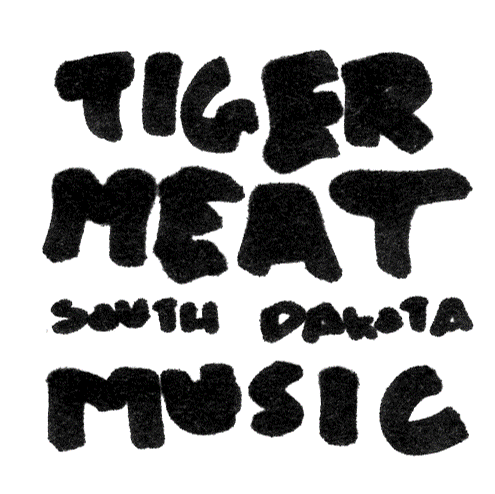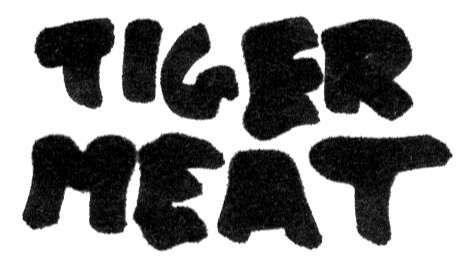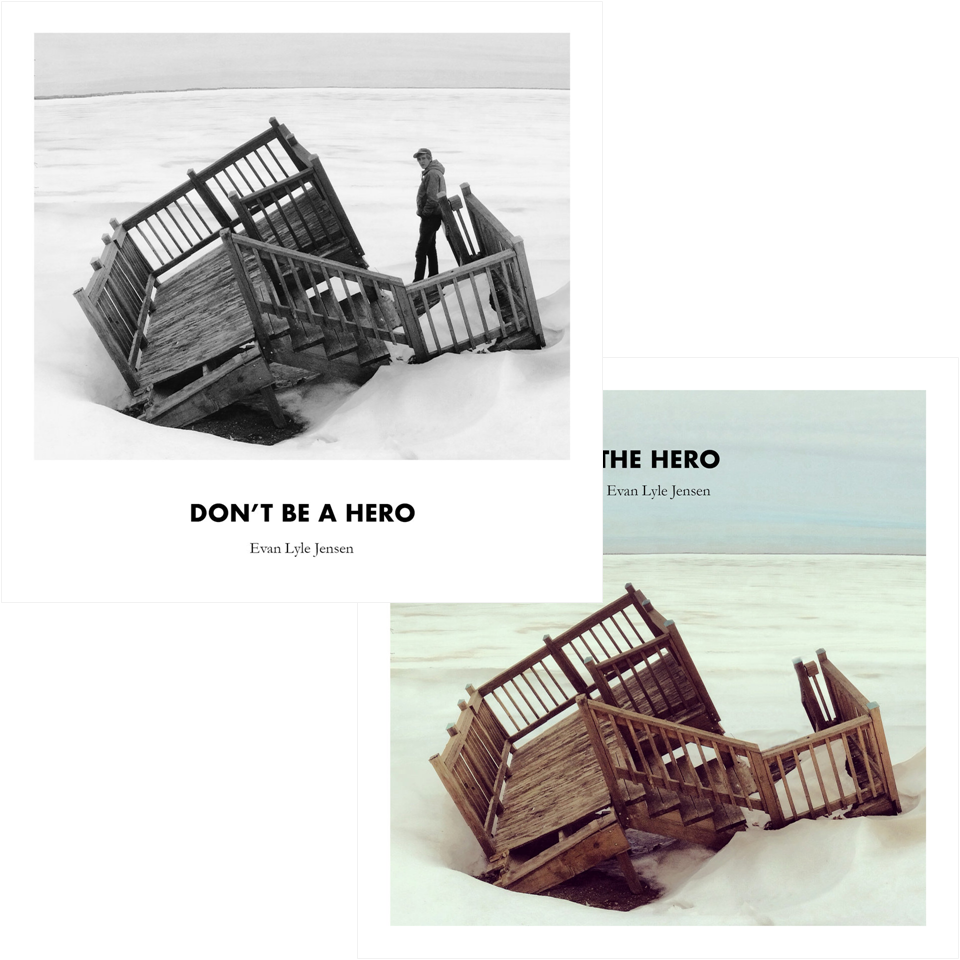Evan Lyle Jensen
Don’t Be a Hero (2017)
& The Hero (2021)
Folk, Rock
- track 4: “Shadow”
Ross McEwen: I’m a Kansas native, Wichita, Kansas. I’m a producer, musician, collage artist, video artist, yeah. So, I’d moved up to St. Paul to attend McNally Smith [College of Music] in 2012, and Evan was a freshman there that year. I met him because we had to pick our music for our final project, so I ended up, like, sniping his project from a kid. And I don’t feel bad at all because this kid did not have the sensibility and, like, the knowledge of what Evan’s vision was. I have always been a huge Sufjan Stevens fan, and Iron & Wine, and all that lo-fi folk, and really wear-your-heart-on-the-sleeve type of songwriting, and this other kid was totally, and still is, like, a pop producer. And once I heard Evan’s music, and I heard this kid was doing it, I went up to [Evan] and I was like, “Hey man,” and I gave him my elevator speech, essentially. We had mutual friends, but I didn't really ever run into him. He was a composition student, so yeah we kind of ran in the same crowds. But I just told him, “Man, like, listen, I know I can get your vision through, 100%.” And I’m so glad I did because the second record [The Hero] would have never been released, and then that first record [Don’t Be A Hero] would have been, just, I can’t even fathom. Like, it wasn’t supposed to happen. If the universe didn’t coalesce in that way… I truly believe that part of my being in Minneapolis, was to cross paths with Evan Jensen. And sorry if I get, like, super emotional in this call. I mean I’m not apologizing, but that’s going to happen.
To me, he was one of the most prolific songwriters, like, in my life. Even sans a personal relationship with him, his lyricism is insane. “Junkyard,” from Don’t Be A Hero, that’s just, like, such a sad song. When we were recording this, I’d never been to South Dakota. I mean Wichita is a small town, but not, like, as small-town as Lake Preston or anything, and he’s driving me around different places, and we’re driving on the back side of Lake Preston, and there’s just, like, a very, very small trash heap. Not even a dump, it’s, like, one person’s trash, and he was like, “Yeah, that mound right there, that’s what inspired me to write ‘Junkyard’.” And I was like, “Wait, what?” It was, like, a couple appliances and a small burn pile, and he writes this just gut-wrenching song. But that’s him. He was able to take things and extrapolate them into these really emotive pieces of art.
//\\//\\//
Would have started Fall semester 2013, recorded March of 2014. He had a ton of songs. Songs that he had written in school through his program, and then songs that he had written very shortly before he moved to St. Paul. So yeah, we kind of combed through them. [For Don’t Be A Hero] he already had all the tracklisting out, and he was like, “No, we're not adding any songs. This is what that group of songs are.” And I just kind of took that at face value and didn’t explore the other stuff.
So the intention of the project, for schooling purposes, was to get used to using the gear they have there, and spend your time in the studio getting comfortable with that. You’re only allowed, I think it was two or three 8-hour blocks for your final project, and I knew that that was not going to give us the vibe and the time we needed to get those core instrumental tracks done. I’m just talking, like, vocals, guitar, and then, like, whatever auxiliary parts he wanted to play and add to it. So we basically had decided that I’m going to, like, beg, borrow, steal as much gear as I can, and we’re just going to go record it at his parents’ house. His parents were on some cruise or on some vacation. It worked out perfectly with our Spring Break, I think, so we spent the entirety of Spring Break at his parents’ farmhouse laying down the principal tracks in Lake Preston. And then they had a cabin on a lake somewhere in that area where we did some other tracking too.
I’m like, the weirder, the better. I mean if it sounds good I’m with it. So, like, we did a lot of weird stuff where, like, the picture of both records, that dock, that’s where we recorded some of the tracks. We set up an amp and he had a microKORG, he’s listening to the track in his headphones, and then I’m, like, a hundred yards away with a nice RØDE stereo mic for iPhones, and I’m like, “Play it as many times as you need and we’ll just go back and nudge it wherever it needs to be.” And we even did that in his barn. His parents have their hay barn, he climbed up on the rafters of this thing on this super sketchy ladder, and we got all the stuff up there and did the same thing: he listened through headphones, did three or four takes, and then we put it where it needed to be.
All my professors hated that record. They all wanted the pristine studio. I remember the one dude that I always butted heads with, he has this real raspy voice, real rough guy, and he’s like, “What the hell is this sound? Sounds like a goddamn cat’s getting choked or something. You gotta get all that tape sound out of there. It’s way too loud. Who wants to listen to a cat get choked?” I’m like, “Well, this is the record. This is what it’s going to be. Like, it’ll sound better than this, but I’m not getting rid of those tape sounds. They’re very integral to the vibe of this thing.” And he’s like, “Whatever.” I think I got a B on it. When I turned it in there was still a lot of mixing that I wasn’t happy with. I still worked on it after I graduated. I had finally accepted where it was at maybe six months before Evan passed away. That was the thing where everybody was like, “Man, thank you so much for releasing this, it must have been really hard.” It’s like, “Yeah, it was, but it was already finished.” All I had to do was get Louie to master it, put it online, get a friend to design the album cover, stuff like that.
Essentially, after I had finished [Don’t Be A Hero] he basically was like, “Yeah, you’re the only one who ever liked my music. It’s clear this album is for you. You can do whatever you want with it, I’m out. I’m out. I’m going to be forty or something and think back on this time and just laugh about it.” Like, a lot of things play into that: The school was going broke and didn’t offer as much scholarship money, he had to quit school but he was still trying to work in Minneapolis, then he moved back, got a house in Lake Preston, he was getting some other degree and not really making music anymore, and he had convinced himself that he didn’t really want to do music anymore when that’s all he ever really wanted to do. So yeah, that’s kind of where it ended. “This is your baby, you’re the one who loved this, it’s your thing now.” And that just devastated me, because my whole thing in the process of this, like I told him, “Man, we met for a reason. Let me be a steward for your music. Like, I dedicate my services, my passions to your life. Whatever you need, I’m there. How many ever projects, I’m there for all of them.” That was my goal, that’s what I wanted. Man, if I could make another couple Evan Jensen records. Like, fuck, you know?
//\\//\\//
His birthday is at the end of January, so all these releases have kind of revolved around his birthday. And his one and only plan for the record was that it be released in the winter. Because, you know, we recorded it just like, not really Spring, almost Spring, but it was still definitely cold as shit. In South Dakota. In Minnesota. And all the songs are very wintery. Like, they’re all, like, hunkered-down, introspective songs. It being five years this year, I’d always had that in the back of my head, like, “I should do another one at some point. Comb through these collections of songs, figure out the best ones that work together, sequence them.”
The Hero is like demos, all recorded by himself. Those tracks, in his mind, would have never been released. They’re all just, like, pre-McNally recordings that he didn’t want on the record, and I was so emotionally moved by them for all these years, that I felt really selfish not sharing. People need to hear “The Homeless, The Carnies, The Regime.” I felt way too selfish having that song to myself, or only a small handful of people having that song. Hindsight’s always 20/20, like, I wish I would have recorded that song. I wish we could have had flutes and all the stuff that we added on [Don’t Be A Hero] because, oh man, that song hit me when I first heard it, but he was so steadfast and convicted in the compilation of songs he had already written that I just had to trust him and take him on that, you know? But that song… That’s the prolific thing. Here’s this kid, like 17, 18, writing these very, very lyrically advanced — you know what I mean? Not your regular 17-, 18-year-old kid is going to put down a song like “The Homeless, The Carnies, The Regime.”
“Jasmine” on The Hero, the first song, it’s a song about his roommate’s cat. He had posted it on SoundCloud, I shared it with everybody, everybody’s like, “Holy shit, this is a phenomenal song.” He’s like, “Nah, it’s trash,” and took it offline. I was so pissed. It didn’t have a downloadable link. So I was over at his house, he was in the shower, I literally got on his computer when he was in the shower and sent that song to myself so it wouldn’t be lost. That’s how much I loved it. I was like, “Screw you. This is a ridiculously good song. If you won’t let anybody else have it, I’m going to take it for myself.” He died not knowing that. He had no idea.
The thing that always stuck out to me and his art was how his emotions are, like, palpably felt through his songs. One song that I’ve spent just hours and hours just sobbing to — and this is even before his passing — is that song “Shadow” about his dog. It’s about his dog and it just rips your — the chorus is like “A dog is just a dog. Why do I mourn over materialistic loss? Let me announce he was the only one who kept all of my secrets.” Oh man, just rip my heart out, you know?
Jodi and Lynn Jensen: We have created a scholarship for our son Evan’s alma mater, Lake Preston High School. We have rarely found one that rewards students for being “Honest and Considerate.” Five years ago we established an annual $1,000 scholarship that recognizes one such student. We would love to continue the “Evan Jensen Memorial Honest and Considerate” scholarship. Any help, especially help from those that appreciated Evan’s music would be greatly appreciated. We miss him greatly.
Anyone in need of help can reach the National Suicide Prevention Lifeline at 1–800–273–8255 or SuicidePreventionLifeline.org
SOURCES
Jensen, Lynn, and Jodi Jensen. Re: Don't Be A Hero & The Hero, 16 Mar. 2021. Email.
McEwen, Ross. Interview. By Jon Bakken on 25 Feb. 2021.




